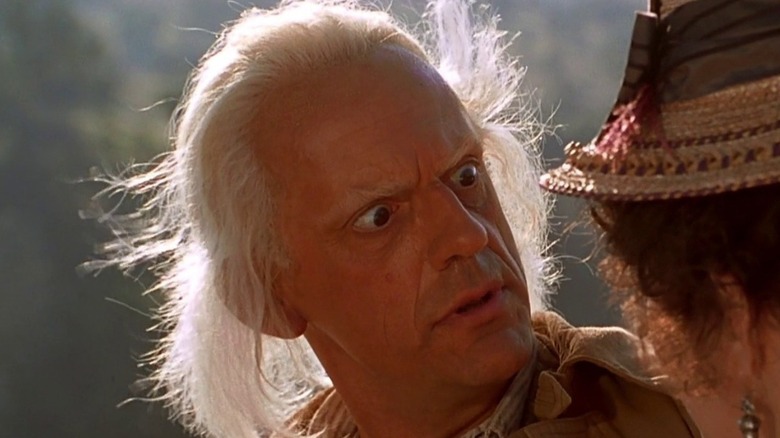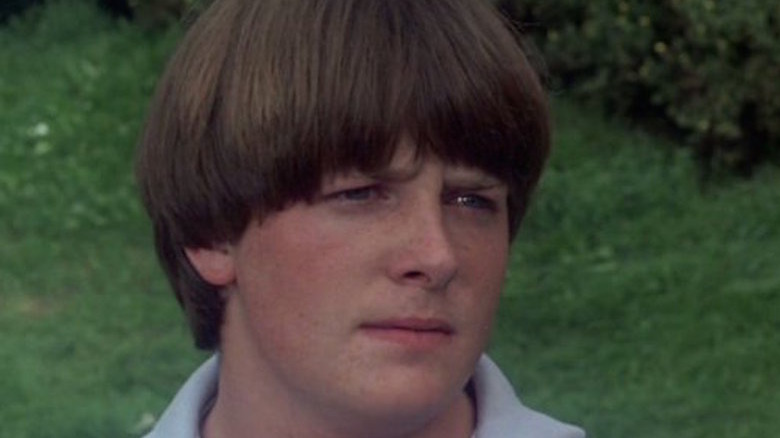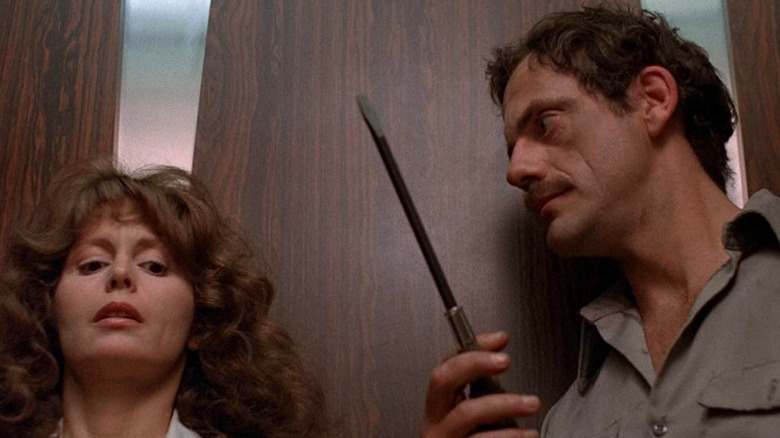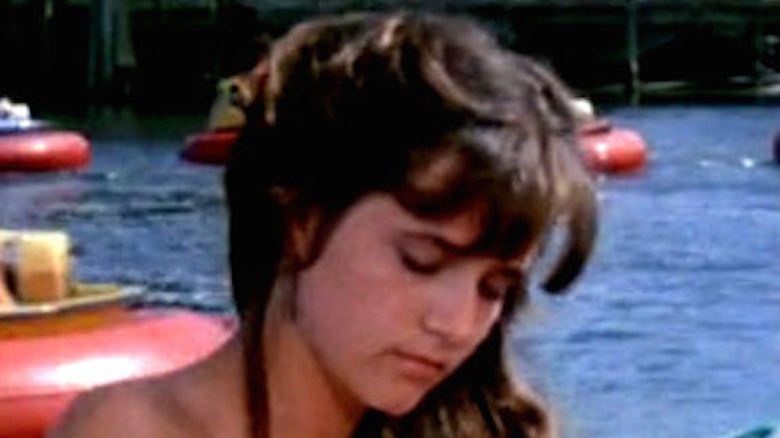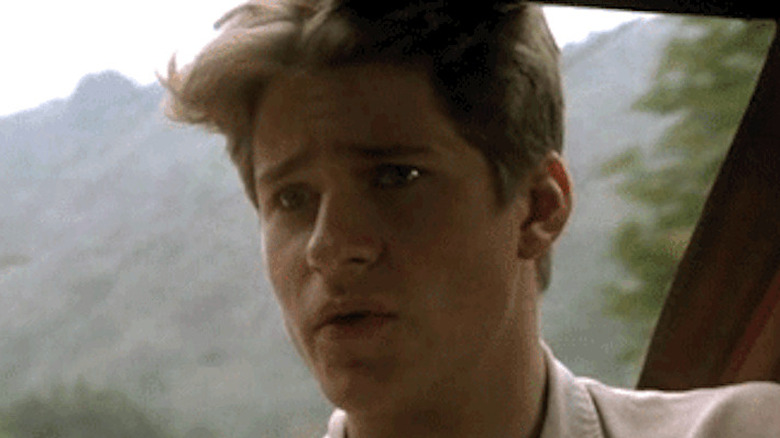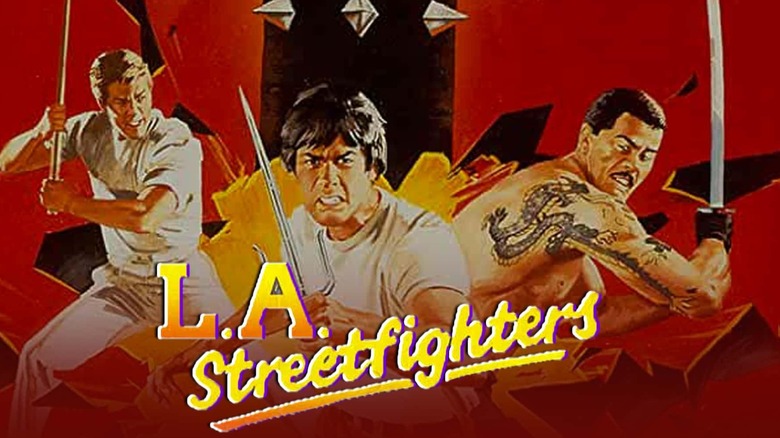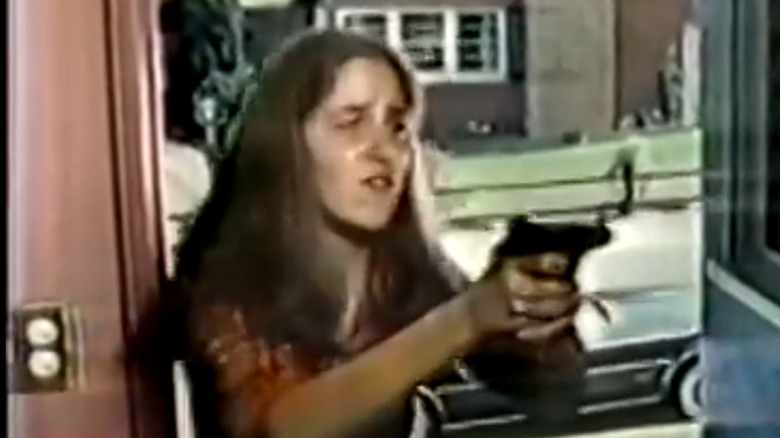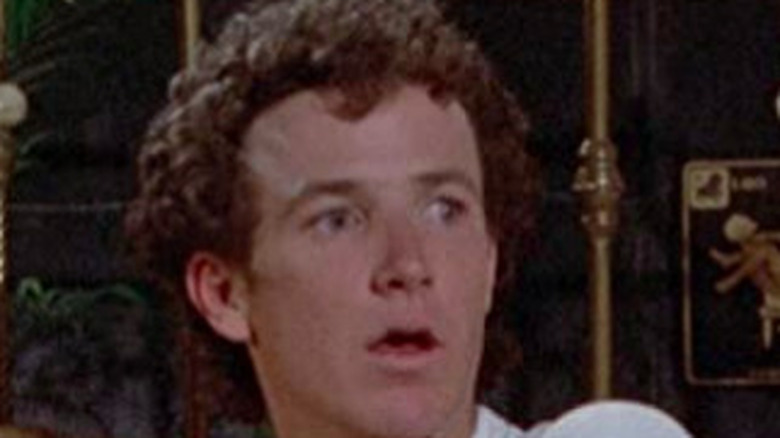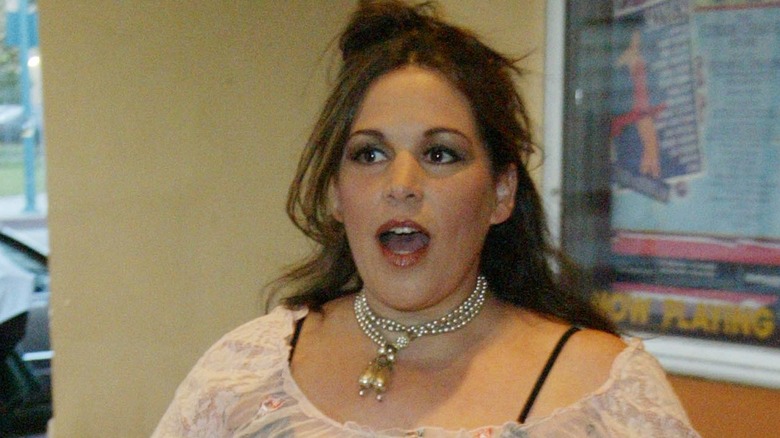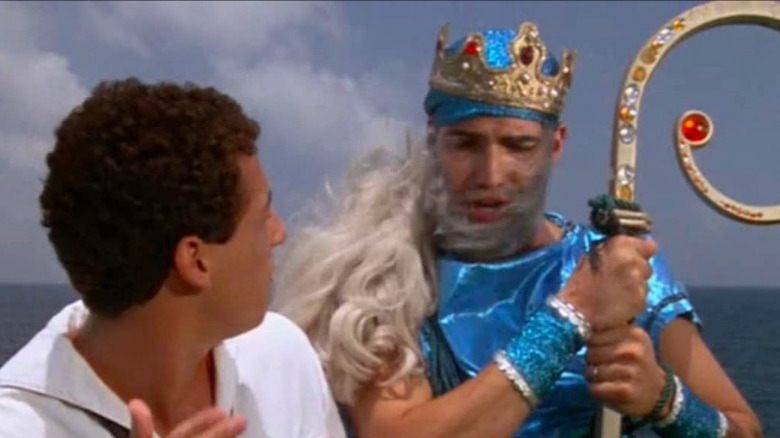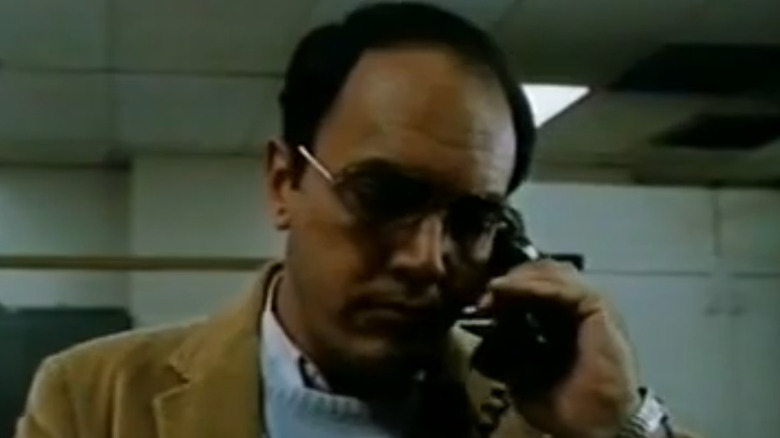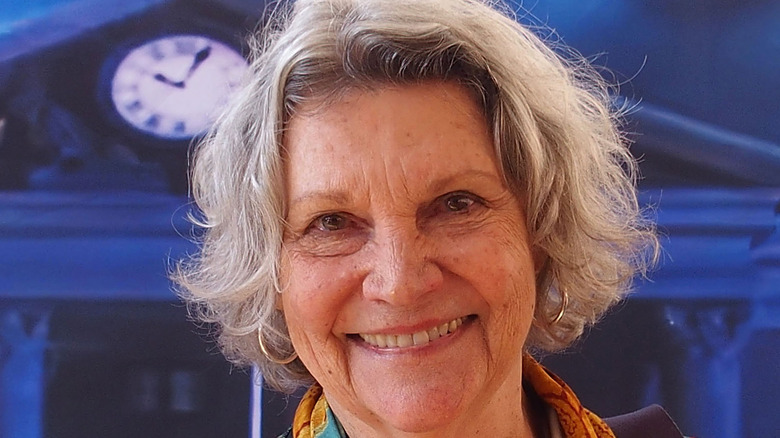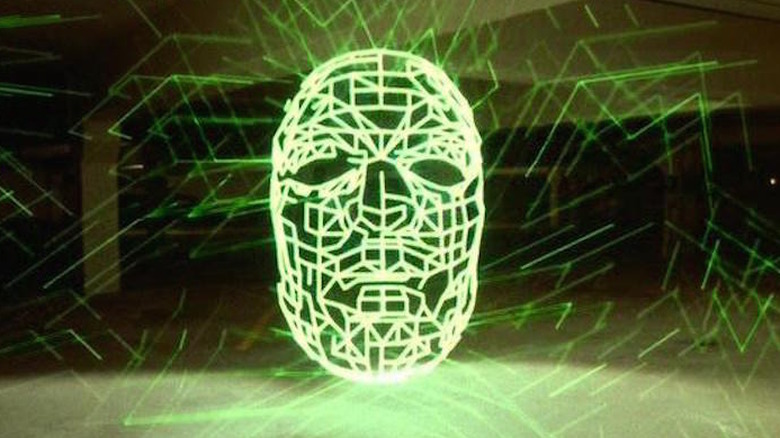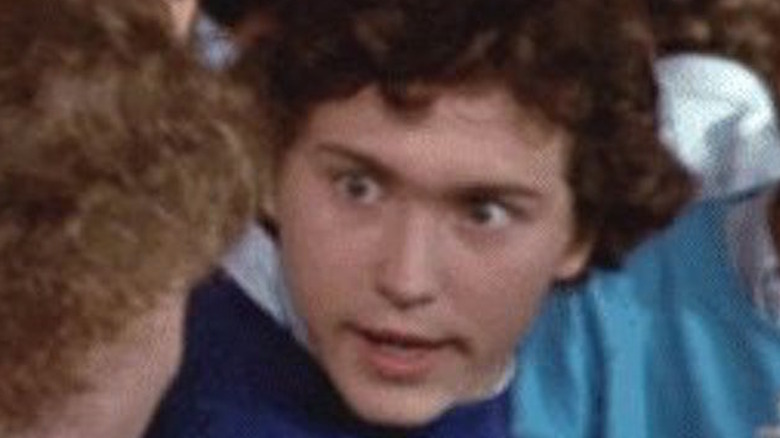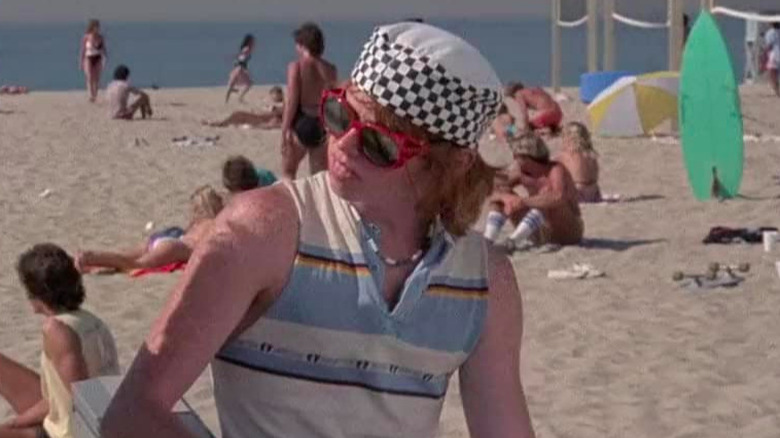Early Roles Back To The Future Actors Would Like You To Forget
The "Back to the Future" film trilogy is a beloved entry in '80s science fiction, enjoying a sizable fan base (the first film, 1985's "Back to the Future," has a 94% rating on Rotten Tomatoes) after nearly four decades alongside continued interest in all things related to Marty McFly and his time-traveling adventures via musicals, theme park attractions, books, and other related media. The film also provided its cast with a blockbuster showcase for their talents that led to more work in features and on television; while Michael J. Fox (Marty McFly) and Christopher Lloyd (Doc Emmett Brown) were both established TV stars thanks to "Family Ties" and "Taxi," respectively, neither had scored a major box office hit as a leading performer in a feature film (the closest Lloyd had come was "Star Trek III: The Search for Spock," albeit in a supporting role). For co-stars like Lea Thompson, Crispin Glover, and Thomas F. Wilson, "Back to the Future" afforded them with not only greater exposure, but also a bona fide success after years of screen work.
As with most actors, the "Back to the Future" cast landed a wide variety of acting roles prior to their participation in Robert Zemeckis's trilogy. Some of these projects were critically financially successful, while others... let's just say that the less moviegoers knew about them, the better. If you're curious about those early misfires and mishaps, you're in luck: following is a spoiler-filled list of early roles that the "Back to the Future" cast would really, really prefer that you forgot.
Michael J. Fox was a bullied nerd in Class of 1984
Prior to his star-making turns on "Family Ties" and in "Back to the Future," Michael J. Fox was a hard-working young actor on episodic TV series and TV movies in his native Canada and later, the United States. Shortly before joining the cast of "Family Ties," Fox (billed as just Michael Fox) made his feature film debut in "Class of 1984," a grindhouse-styled revenge thriller lensed in Toronto. Directed by genre-hopping cult filmmaker Mark L. Lester ("Commando," the '85 "Firestarter") and based on a story by Tom Holland ("Child's Play"), "1984" stars Perry King as a teacher who takes on the gang of thugs terrorizing an urban school.
Among the "nice" students targeted by the gang – led by future "Sopranos" and "Perry Mason" director Timothy Van Patten, and all tricked out in outlandish "punk" clothes – is Fox as hapless band geek Arthur. Saddled with low self-esteem and a ridiculous haircut, Arthur spends most of his screen time serving as a punching bag for Van Patten's goons. But the film isn't interested in providing Arthur with a character arc: his primary purpose is to get stabbed in the cafeteria in order to get King to drop the do-gooder act and wreak spectacularly bloody violence on his former students. Though it drew mixed reviews from critics, "1984" was enough of a hit (via The Numbers) in theaters and on home video to warrant two sequels – the sci-fi themed "Class of 1999," and "Class of 1999 II: The Substitute," both of which bore the slightest of connections to the 1982 film.
Christopher Lloyd got creepy in Schizoid
Though Christopher Lloyd has played more than his fair share of eccentric characters in features and on television, the oddballs he tackled in the early stages of his screen career weren't always as endearing as Doc Brown in "Back to the Future" or his Emmy-winning turn as the Reverend Jim Ignatowksi on "Taxi." They tended towards aggressive types, like Max Taber in "One Flew Over the Cuckoo's Nest," or the outlaw Butch Cavendish in "The Legend of the Lone Ranger." Lloyd also took this weird route for the sleazy 1980 horror film "Schizoid," which starred Klaus Kinski as a therapist overseeing a support group whose members are falling victim to an unseen assailant.
Anyone familiar with Kinski's berserk screen persona (via the New York Times) knows that he's the last person you'd want in charge of your mental health, but in "Schizoid," he not only keeps the group active but also manages to have intimate relationships with two of its members. However, he's not immediately pegged as the killer: that falls to Lloyd's weirdo maintenance man, Gilbert, whose big scene involves trapping group member Marianna Hill in an elevator and telling her that he's obsessed with her while fingering a switchblade. But writer-director David Paulsen soon shuffles Lloyd off-screen to make room for more gruesome murders, voyeurism, and various forms of ugly behavior carried out by the real culprit, Kinski, who eventually earns his just rewards courtesy of his own daughter. It's too bad Lloyd's screen time is so brief: it's a particular talent that can make Klaus Kinski seem like the second creepiest character in a horror movie, but Lloyd pulls it off.
Lea Thompson was nearly shark bait in Jaws 3-D
For Lea Thompson, who played Marty McFly's past, present, and future mom, Lorraine, in "Back to the Future, the 1985 film "Howard the Duck" would seem the obvious choice for the early screen credit that she'd like to keep out of the spotlight, However, as a Hollywood Reporter retrospective noted, the Marvel misfire has actually enjoyed something of a revival in the past few decades – helped in no small part by Howard's appearances in "Guardians of the Galaxy" and "Marvel's What If...?" Thompson herself has professed her fondness for the film and has even tried to launch her own "Howard" feature. So the title of Thompson's worst early film role actually falls to 1983's "Jaws 3-D."
An absolutely unnecessary sequel with woeful 3-D effects that was at one point envisioned as a comedy (via Wired), "Jaws 3-D" moves the shark-vs.-human action to SeaWorld Orlando, where Dennis Quaid (as the son of Roy Scheider's Martin Brody) discovers that yet another great white shark has him on its dinner menu. Thompson is on board as a pert member of the park's water-skiing team and potential love interest for John Putch, who plays Quaid's younger brother. Thompson's big scene involves luring Putch out for a ride on the park's bumper boats in order to help him get past his (completely understandable) fear of the water. This goes spectacularly awry when the shark shows up and bites Thompson, who subsequently – and no doubt happily – disappears from the rest of the film.
Crispin Glover suffered a dorky death in Friday the 13th: The Final Chapter
Though "Friday the 13th" fans have worked overtime to retcon the reputation of the fourth entry in the long-running slasher franchise, the facts about "The Final Chapter" are these: while not as stupefying as some of the worst "Friday" films (that would be "Jason Goes to Hell" and "Jason Takes Manhattan") it's still a boneheaded entry, full of reprehensible characters (looking at you, Ted, with that weird "computer says" routine, and gross morgue attendant Axel) and get-outta-here-with-that scripting (Tommy's big rescue plan is to dress up as a kid version of Jason?). However, "Final Chapter" does have one thing going for it: it co-stars Crispin Glover as that doomed, romantic dancing machine, Jimmy.
Though Glover took the role solely for the paycheck (as he told Yahoo in 2019), he invests a tremendous amount of his signature energy and presence into Jimmy, who stands out as the only actual human being in "Final Chapter." Sure, he looks ridiculous during in that dance sequence – the subject of what seems like a million GIFs – but he's an entirely sympathetic character, nursing a broken heart while also dealing with jerks like the aforementioned Ted. No sooner has he found some degree of romantic connection (sort of) with Camilla More's Tina than he runs into Jason, who dispatches him with a one-two combination of corkscrew and machete. And while that moment fulfills the ultimate purpose of "Final Chapter" – to generate more gore – it's still extraordinarily mean-spirited. Jimmy just wanted to be loved. And dance. Was that so wrong?
Good luck finding Thomas F. Wilson in L.A. Streetfighters
There are plenty of ways to enjoy Thomas F. Wilson's acting and comic talents. He's in all three "Back to the Future " films, playing bully Biff Tannen and members of his extended family; you can also see him on "Freaks and Geeks" and "Legends of Tomorrow" or in "The Heat," or hear his versatile voice acting in animated projects like "SpongeBob SquarePants" and "The Patrick Star Show." Chances are you won't see him in 1985's "L.A. Streetfighters," even though it's his first screen project. Wilson plays an unnamed member of a criminal crew known as the Spikes Gang, and his role is so minor that he's invisible to all but the most eagle-eyed viewer. That fact, however, shouldn't deter you from experiencing this truly bizarre martial arts action film.
As noted in the invaluable martial arts history, "These Fists Break Bricks," taekwondo master Jun Chong, who starred in the bizarre 1976 Bruceploitation feature "Bruce Lee Fights Back from the Grave," shares top billing with fellow martial arts instructor turned actor Philip Rhee ("Best of the Best") in "Streetfighters." Despite being long past their teenaged years, Rhee and Chong both play high schoolers that run afoul of (equally middle-aged) gang leader James Lew while also navigating new loves, family drama, and legendary kickboxer Bill "Sugarfoot" Wallace. Complete technical ineptitude and plot illogic are stamped across every frame of "L.A. Streetfighters," which was also released as "Ninja Turf," despite its complete lack of ninja. Director Richard Park Woo-Sung later made the even more ridiculous "Miami Connection," which disappeared for more than 20 years after its 1987 release but found a new audience as a cult favorite in 2012.
Claudia Wells turned bad on Strike Force
Though Claudia Wells' most enduring screen credit remains her single turn as Marty McFly's girlfriend, Jennifer Wells, in the first "Back to the Future" (she was replaced in subsequent films by Elizabeth Shue), the actress had a fairly substantial career on television during the 1980s. She starred in two short-lived series – "Off the Rack" with Ed Asner and the "Fast Times at Ridgemont High" adaptation "Fast Times" – and enjoyed guest roles on numerous episodic programs, including "Simon & Simon" and "Trapper John, M.D." Wells also starred in a riotously wrong-headed episode of the forgotten Aaron Spelling crime series "Strike Force" in 1981.
"Strike Force" concerned yet another "elite team" of police dedicated to bringing down the worst criminals in the city of Los Angeles. In the series' fifth episode, "Magic Man," the bad guy of the week is Paul Thomas Anderson favorite Robert Ridgely, who recruits local teenagers to peddle his "kiddie bait" – stickers laced with LSD. Ike Eisenmann plays a member of his high school crew who samples his own goods and takes a dive off the freeway, prompting fellow dealer Wells to force Strike Force chief Robert Stack for help before Ridgely ropes in her younger brother (Keith Coogan). Wells is saddled with a clichéd character – the Good Girl in a Bad Crowd – but remains professional, even when she has to pull a gun on Stack before collapsing into a puddle of tears. The show itself was a heavy-handed throwback, a '50s-style cop show in Reagan-era fashions, and was kicked off the force after a single season.
Marc McClure tried for laughs in Pandemonium
Character actor Marc McClure is perhaps best known for playing Jimmy Olsen to Christopher Reeve's Clark Kent in 1978's "Superman," its three sequels and 1984's "Supergirl," and the amiable, personality-free Dave McFly in the first and third "Back to the Future" films (he's only featured in a deleted scene in "Back to the Future Part II"). McClure's also worked in other hit films, including "Apollo 13," the '78 and '03 versions of "Freaky Friday," and "Zack Snyder's Justice League," and like most actors, he's also turned up in a few stinkers... the most fragrant of which is probably 1982's "Pandemonium."
A parody of slasher films, "Pandemonium" boasts an impressive pedigree: director Alfred Sole helmed the creepy 1976 horror title "Alice, Sweet Alice," while co-writer Richard Whitley also helped pen the cult classic "Rock 'n' Roll High School." It also features very funny people in the cast, including Paul Reubens and fellow Groundlings and "Pee-Wee's Playhouse" alumni Phil Hartman, Edie McClurg, John Paragon, and Lynne Marie Stewart, as well as Carol Kane, Judge Reinhold, David L. Lander, and Tom Smothers. What it doesn't have is a funny script or competent direction: Sole seems totally unsure of how to deliver the "Airplane"-style barrage of jokes, and save for a few funny visual puns (a row of cheerleaders skewered by a single javelin), the script is dead on arrival. Like most of his castmates, McClure knows his way around a gag and earns a few chuckles as a libidinous male cheerleader while attempting to maintain his dignity in moments like the killer shoving a pom-pom down his throat. That's the level of yucks in "Pandemonium," so approach with caution.
Wendie Jo Sperber brought fun to The First Time
A well-loved if frequently underutilized comic presence in features and on television in the 1980s and 1990s, the late Wendie Jo Sperber turned up as Marty's lovelorn sister Linda in "Back to the Future" and "Back to the Future Part III." Her turn as Linda was her third of four appearances in a Robert Zemeckis film – Sperber starred in "I Want to Hold Your Hand" and turned up briefly in 1980's "Used Cars" – but between these assigments, she also enjoyed a comic turn in the little-seen 1983 comedy "The First Time." The film marked the directorial debut of Charlie Loventhal, who based his feature on his own experiences studying film at Sarah Lawrence under Brian De Palma (via the New York Times). The "Scarface" and "Untouchables" director apparently took a shine to Loventhal's script and served as creative consultant on the production.
Though marketed as a randy sex comedy by its distributor, the then-fledgling New Line Cinema, "First Time" is actually quite tame and even sometimes amusing in depicting the bedroom ambitions of its hero, hopeless college freshman Tim Choate, and his actual ability to meet girls. The problem is that once "The First Time" introduces that paradox, it stays in that groove for the remainder of the picture: the characters, which include Wallace Shawn and Marshall Efron as eccentric professors, are mostly stock, and Choate is such a wet blanket that his success at school and women only improves after his mother arrives on campus. Sperber gives the picture a jolt of excitement as a lustful fellow student who pursues Choate in vain; she's funny and sexy and full of life, which is more than can be said about "The First Time."
Before Titanic, Billy Zane was in another ocean-bound disaster: Going Overboard
Billy Zane's earliest film role was actually something he'd most likely want you to know about: he made his screen debut as Match, who backs up Biff Tannen in "Back to the Future." After reprising the role in "Back the Future Part II," Zane's screen career took off with roles opposite Nicole Kidman in "Dead Calm," as well as "Memphis Belle" and James Cameron's "Titanic." But also lodged between these titles was also 1989's "Going Overboard," a woeful comedy (just 11% on Rotten Tomatoes) that also happened to mark the screen debut of Adam Sandler shortly before he joined the cast of "Saturday Night Live" in 1990.
Sandler played Shecky Moskowitz, a comedian whose inability to get a laugh didn't stop him from taking a job on a cruise ship in order to perform his stand-up act. If this seems like the long way around to land a gig, you would be right, but that fact didn't seem to bother Shecky, nor did of abuse he received from the ship's resident comic (Scott LaRose) and various passengers, including a pre-fame Billy Bob Thornton and Peter Berg.
"Rocky" star Burt Young was also around as a Central American dictator, as was Zane's sister, Lisa Zane, as a mean-spirited Australian pageant contestant. Her presence probably accounted for Zane's cameo in the film as King Neptune. Though tricked out in a spangled tunic and dollar-store beard, he seemed to enjoy himself: Zane, who yelled all of his dialogue at a breathless pace, appeared to be on the verge of laughing at any moment. The makers of "Going Overboard" can take that element to heart: at least someone found this movie amusing.
George DiCenzo survived Starflight: The Plane That Couldn't Land
A dependable character actor who could play everything from the villainous Hordak on "Masters of the Universe" to Lorraine McFly's grumpy dad, Sam Baines, in "Back to the Future," George DiCenzo was best remembered for tough authority figures in the original TV production of "Helter Skelter," "Close Encounters of the Third Kind," and even the "Grand Theft Auto: Vice City." An actor with as many credits as DiCenzo, whose career arc ran from the early 1970s to 2006 before his death in 2010, is bound to log hours in a few lightweight projects. For DiCenzo, that number includes "Starflight: The Plane That Couldn't Land."
The 1983 ABC TV-movie concerns a "hypersonic" plane (that means it flies really fast) that runs into serious trouble on its maiden flight from California to Australia. Debris from an experimental rocket impacts with the plane and sends it into space, where the passengers face death from lack of oxygen, burning in re-entry, or from a risky rescue plan involving the Space Shuttle Columbia and a sort of emergency slide.
Special effects by Oscar winner John Dykstra show the constraints of TV budgets, and the script shoves a capable cast into soap opera scenarios. Pilot Lee Majors is carrying on an affair with flight attendant Lauren Hutton, Hal Linden sweats bullets as Starflight's designer, Robert Webber is a panicky reporter, and Ray Milland and Terry Kiser ("Weekend at Bernie's") sneer as various bad guys. DiCenzo is on hand as the tech-minded guy in aviator glasses who tells Linden that his super-plane isn't ready for flight. Of course, no one listens to him, and if "Starflight" proves anything, it's that you should always listen to guys like George DiCenzo.
Frances Lee McCain stays out of the psychobabble in Secrets
First things first: Frances Lee McCain appears briefly (at best) in the 1977 TV-movie "Secrets," but its inclusion in this list is due to the fact that most, if not all of her credits prior to her turn as Lea Thompson's mom, Stella, in "Back to the Future" are quality projects. These include several big hits, like "Footloose" and "Gremlins," but also sleepers like "The Laughing Policeman" and Albert Brooks's hilarious "Real Life," high-profile TV-movies (1982's "Marion Rose White") and critically praised series like "Lou Grant," "St. Elsewhere," and "The Bob Newhart Show." So it falls to the extremely obscure TV-movie "Secrets" to provide McCain with a (possibly) regrettable credit.
A tawdry slab of psychobabble dressed up as a deep dive into a woman's psychological makeup, "Secrets" stars Emmy-nominated actress Susan Blakely as a seemingly happy wife and mother who dives headlong into a series of affairs and intimate relationships in an attempt to root out the key to happiness. Her pursuit follows a path that at times resembles a late-night Cinemax movie (albeit a totally chaste one due to network standards): Blakely attempts to seduce her teenage sister's boyfriend and undresses in front of her piano tuner (who's blind, by the way). The soap opera-style reason for her carnal quest is the death of her domineering and repressive mother, who took her as a child to a puppet show in which a creepy queen marionette told to be good but pretend that you're not. Blakely's mom frequently merges with the queen puppet in dream sequences to drive home that warped point in case viewers didn't catch it the first five or six times.
James Tolkan voiced a homicidal arcade game in Nightmares
Gruff-voiced James Tolkan, who played Valley High School assistant principal Mr. Strickland ("Slackers!") in all three "Back to the Future" films and the animated series, was a dependably tough presence in dozens of features and TV series from the early 1970s to the present, including "WarGames," "Top Gun," "Dick Tracy," and "Bone Tomahawk." He's also logged time in some fairly silly or forgettable films, including "Masters of the Universe" and "Problem Child 2," but Tolkan actually doesn't appear at all in one of his most memorably goofy titles. At least, in person.
Tolkan drops his usual sandpapery tones in favor of a urbane and emotionless delivery for the voice of the Bishop of Battle, the boss in a supposedly unbeatable video game in a segment of the same name in the 1983 horror anthology "Nightmares." Emilio Estevez stars in the segment as an arcade regular obsessed with reaching the game's legendary 13th level. What follows is both predictable and completely absurd: Estevez reaches the level, only to see the arcade cabinet explode and release its 3-D combatants into the real world. A shoot-out ensues and Estevez appears to escape – but the face of the Bishop itself appears and... eats Estevez? Not sure, but we next see him trapped inside the game itself, which is, like the film itself, is neither scary or particularly novel.
Casey Siemaszko is among the '80s stars in the cheesy Class
The burdens of 1983's "Class" do not lie on the shoulders of actor Casey Siemaszko, who played Biff's henchman, 3-D, in the first two "Back to the Future" films. He has a only minor role in "Class," which also features several other '80s stars in waiting who play hormonally supercharged teenagers (including John Cusack, Alan Ruck, and Virginia Madsen) in this well-made but stunted comedy-drama about the perils of sleeping with your school roommate's mom. The culprits are co-writers Jim Kouf and David Greenwalt, who co-created "Grimm" and worked (together or separately) on "Angel" and "National Treasure" but also wrote/co-wrote such turkeys as "Up the Creek," "Snow Dogs," and "Secret Admirer." Their work on "Class" falls somewhere between the good and the bad in their work: it's amusing at times but eventually tumbles headlong into sniggering sex comedy territory.
Andrew McCarthy is the poor kid at an exclusive prep school who rooms with rich Rob Lowe. A string of degrading pranks puts them at odds but the pair eventually become fast friends, and Lowe sets out to help McCarthy lose his virginity. Jacqueline Bisset is the older woman who assists McCarthy in this endeavor, which (understandably) re-opens his rift with Lowe. The two punch it out before abruptly reconciling their differences, and if that seems like a huge elephant in the room to ignore, you would be correct. But "Class" is ultimately less interested in plot logic than delivering fantasy material for its intended audience (teen boys), which culminates in Madsen having her shirt ripped off. Classy.
Courtney Gains should have given Hardbodies the bird
Though the name might not be immediately familiar, you certainly know Courtney Gains's face: he's the malevolent Malachi in "Children of the Corn," weirdo Hans Klopek in "The 'Burbs," sympathic nerd Kenneth in "Can't Buy Me Love," and of course, the second-string bully Mark Dixon, who is rebuffed on the dance floor by George McFly in "Back to the Future." Gains has worked steadily since the early '80s in indie titles, episodic TV, and studio features. As is often the case, some of these efforts are memorable, some are sleepers, and some are wretched, as is the case with 1984's "Hardbodies."
A slope-browed sex comedy that haunted late-night cable broadcasts and VHS shelves for decades, "Hardbodies" posits the idea that women are more than willing to get intimate with even the lamest guys as long as their pick-up lines are creative. To that end, beach lothario Grant Cramer teaches a quartet of middle-aged goons how to score with girls half their age. Gains is on hand as Cramer's semi-feral pal Rags, who serves as the movie's proof positive that no matter how far down on the evolutionary ladder one may be, you can still score with the ladies if you have the right words.
Language is also the key to another scene with Rags in which he executes a series of complicated, almost dance-like gestures. These are revealed to be the all the ways to give someone the finger in different languages. This is arguably the most amusing scene in "Hardbodies," which should give you an idea of how the rest of the picture plays out.
